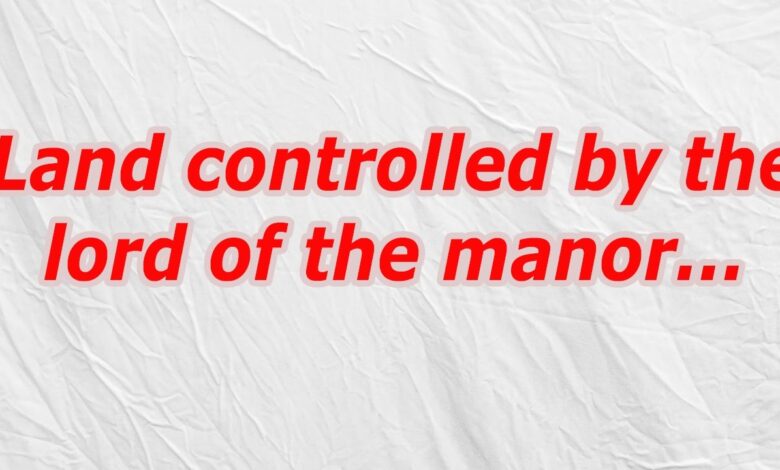Things to know about land controlled by the lord of the manor

Welcome, land controlled by the lord of the manor land enthusiasts and curious readers, to a captivating exploration of the intriguing world of manorial land ownership! Today, we delve into the domain of the enigmatic figure known as the Lord of the Manor. Prepare to embark on a journey through history, unraveling ancient origins and shedding light on contemporary controversies.
Like characters from folklore or medieval tales, Lords of the Manor have long held sway over their vast domains. But what exactly does it mean to be a Lord of the Manor? How did this unique form of land ownership come about? And what rights and responsibilities accompany such an esteemed position?
In this blog post, we uncover these secrets and more as we explore everything you need to know about land controlled by the Lord of the Manor. So fasten your seatbelts (metaphorically speaking) and join us on this engaging adventure into lands steeped in tradition, power struggles, and modern debates. Let’s begin our journey with a glimpse into its fascinating history!
History and origin of manorial land ownership
The history and origin of manorial land ownership can be traced back to feudal times, where the lord of the manor was granted extensive powers over his domain. This system emerged in medieval Europe as a way to organize and govern agricultural lands.
In this hierarchical structure, the lord of the manor held ultimate control over the land and its resources. The origins of these privileges can be found in the legal framework established by monarchs, who granted individuals with noble titles vast estates as rewards for their loyalty or military service.
Manorial land ownership played a crucial role in supporting local communities during this time. The lord provided protection and justice for his tenants while extracting rent from them through various means such as labor or produce.
Over centuries, manorial rights evolved and became more complex. Lords gained additional privileges such as hunting rights, fishing rights, mining rights, and even jurisdictional authority within their territories. These rights were often passed down through generations or bought and sold between nobles.
As society changed with industrialization and urbanization, many aspects of manorial land ownership lost relevance. However, remnants of this ancient system still exist today in some parts of the world.
Understanding the history behind manorial landownership helps shed light on why certain individuals hold significant power over specific areas. It also highlights how historical events shaped present-day property laws and regulations.
By exploring our past, we gain insights into how our current systems have been influenced by earlier social structures – both positive aspects that persist today despite criticism surrounding unequal distribution of wealth tied to these historic practices.
Rights and responsibilities of the Lord of the Manor
Rights and responsibilities of the Lord of the Manor
As the Lord of the Manor, one possesses a unique set of rights and responsibilities. These rights are rooted in historical traditions and can vary from one manor to another. They provide certain privileges that have been passed down through generations. Alongside these rights come important responsibilities that must be upheld.
One key responsibility is maintaining the land and ensuring its proper management. The Lord oversees aspects such as agricultural practices, repairs to buildings, and conservation efforts. This involves working closely with tenants or farmers who rely on the land for their livelihoods.
Furthermore, as a steward of manorial land, it is crucial for the Lord to uphold legal obligations towards both tenants and local communities. This includes adhering to regulations regarding lease agreements, property boundaries, and environmental laws.
Another significant responsibility is preserving historical features associated with the manor. From ancient buildings to historic landmarks, it falls upon the Lord to protect these cultural treasures for future generations.
In addition to these duties, Lords often play an active role in local governance by participating in community projects or supporting charitable initiatives within their area of influence.
Being a Lord of the Manor entails not only enjoying certain privileges but also shouldering essential obligations related to land management, tenant relationships
Common types of manorial rights
When it comes to manorial rights, there are several common types that the Lord of the Manor may possess. These rights have been passed down through generations and provide unique privileges on the land.
One such right is known as mineral rights. This grants the Lord of the Manor ownership over any minerals or substances found beneath the surface of their land. It can include valuable resources like coal, oil, or natural gas. The extraction and selling of these minerals can potentially bring significant financial gain to the lord.
Another common type of manorial right is sporting rights. This gives the lord exclusive permission to hunt, fish, or engage in other recreational activities on their land. They may even have control over who else is allowed to participate in these activities, often charging fees for access.
The right of pasture is also prevalent among lords of manors. This allows them to graze livestock on their land or lease grazing rights to others for a fee. It ensures that they maintain control over agricultural practices and can generate additional income from farming activities.
Additionally, lords often hold fishing rights which grant them sole authority over fishing in rivers or lakes located within their manor’s boundaries. This not only provides an enjoyable pastime but can also be a source of revenue if they choose to sell fishing permits.
These are just a few examples of common manorial rights held by lords throughout history. Each one represents a distinct privilege associated with owning and managing land under this feudal system – creating complex dynamics between lordship and those who live upon his domain.
How manorial land is used and managed
Manorial land, controlled by the Lord of the Manor, holds a significant role in shaping the landscape and communities it encompasses. How this land is used and managed varies depending on various factors such as location, historical context, and legal obligations.
One common use of manorial land is agricultural purposes. These vast stretches of fertile soil have been cultivated for centuries to grow crops or raise livestock. The Lord of the Manor might lease out portions of their land to local farmers or oversee farming operations themselves.
Additionally, manorial land often includes woodlands that serve both practical and recreational purposes. Timber from these forests can be harvested sustainably for construction or fuel while also providing habitats for wildlife and offering picturesque settings for outdoor activities like hiking or hunting.
Water resources are another crucial aspect of managing manorial land. Rivers, lakes, ponds, and streams found within these estates may require maintenance to ensure proper drainage or irrigation systems are in place for agricultural needs.
Furthermore, maintaining historic buildings within the estate is essential for preserving their cultural heritage. The Lord of the Manor might undertake restoration projects to keep these structures intact while balancing modern functionality with historical integrity.
Public access also plays a part in how manorial land is managed today. Some Lords allow public footpaths or rights-of-way through their properties to promote enjoyment and appreciation of nature while respecting boundaries set by law.
In recent times, there has been growing interest in sustainable practices on manorial lands. From adopting organic farming methods to enhancing biodiversity through rewilding efforts, many Lords recognize the importance of protecting natural resources alongside traditional uses.
The management decisions made concerning manorial lands must strike a delicate balance between honoring tradition and adapting to contemporary environmental concerns. As society evolves its understanding about sustainability and conservation efforts intensify globally, there will undoubtedly be continued discussions surrounding responsible stewardship over this unique type of territory.
Current controversies surrounding manorial land ownership
Current Controversies Surrounding Manorial Land Ownership
Manorial land ownership has not been without its fair share of controversies. One major issue that arises is the question of fairness and social justice. Critics argue that it is inherently unfair for a small group of individuals to hold such extensive control over valuable land while others struggle to find affordable housing or access to natural resources.
Another point of contention revolves around the rights and privileges granted to lords of the manor. Some argue that these rights, such as mining and hunting, can result in significant environmental damage if not properly regulated. This raises concerns about sustainability and conservation efforts.
Additionally, there are ongoing debates about inheritance laws related to manorial land ownership. In some cases, these lands have been passed down through generations within certain families, leading to a concentration of wealth and power in specific lineages. This can perpetuate inequality and limit opportunities for social mobility.
Furthermore, there have been instances where lords of the manor have faced criticism for their management practices on the land they control. Accusations range from neglecting maintenance responsibilities to exploiting tenants through excessively high rents or restrictive agreements.
These controversies highlight the need for careful consideration when it comes to balancing historical traditions with modern societal needs. Finding solutions that address concerns regarding fairness, environmental impact, inheritance laws, and responsible stewardship will be crucial moving forward.
It is important to note that opinions on this topic vary widely among different stakeholders – from those who believe in preserving traditional systems to those advocating for more equitable distribution of resources. Finding common ground may require open dialogue between all parties involved in order to shape a future that respects both tradition and progress.
Conclusion: The future of manorial land ownership
Conclusion: The Future of Manorial Land Ownership
As we delve into the fascinating world of manorial land ownership, it becomes clear that this ancient system still holds significant influence in certain land controlled by the lord of the manor parts of the world. Despite its historical roots, it continues to shape and impact modern society.
While some may view the lord of the manor as a relic from a bygone era, others see value in preserving these traditional rights and responsibilities. The future of manorial land ownership is uncertain, with ongoing debates surrounding its legitimacy and relevance in today’s society.
On one hand, there are those who argue for land controlled by the lord of the manor maintaining the status quo, recognizing the cultural significance and historical importance associated with manorial estates. They believe that protecting these rights ensures continuity and heritage preservation.
On the other hand, critics question whether such feudalistic practices have a place in our modern legal framework. They raise concerns about inequality and exploitation within a system where individuals hold considerable power over vast tracts of land.
It is worth mentioning that efforts have been made to reform or abolish aspects of manorial land ownership in certain jurisdictions. In countries like England, legislation has been enacted to regulate certain aspects of manorial rights and land controlled by the lord of the manor ensure fair treatment for tenants or residents on such lands.
Looking ahead, striking a balance between tradition and progress will be crucial when considering the future trajectory of manorial land ownership. It requires careful deliberation on how best to preserve history while addressing contemporary societal needs.
Whether through legislative reforms or social change, finding common ground will be essential to navigate potential challenges associated with this unique form of property ownership. Only then can we determine how best to safeguard our shared heritage while upholding principles of equity and fairness for all involved parties.
In conclusion (without using “in conclusion”), understanding the intricacies surrounding land controlled by lords of the Manor provides valuable insights into an age-old institution that remains relevant today. By appreciating its history, acknowledging current controversies, and envisioning what lies ahead, we can engage in meaningful discussions about the future of manorial land




